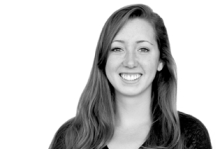Submitted by Jason Young
on
Every year the University of Washington offers several Mary Gates Research Scholarships to enhance the educational experiences of undergraduate students engaged in research with faculty. In 2013-2014 the University offered two rounds of these competitive scholarships, with applications submitted in the Autumn Quarter or in Winter Quarter. The Department of Geography is proud to announce that three of its students won the scholarship across these two periods. A big congratulations goes out to winners Phoebe Merritt, Richard McGovern, and Breanna Hudson! Learn a bit about their research below:
Phoebe Merritt is working with Dr. Suzanne Withers on her research, but has also received guidance from Dr. Sarah Elwood along the way. According to Phoebe: "My research revolves around OpenStreetMap, the Wikipedia of mapping. I'm exploring this crowdsourced map's attribute quality, which involves delving into the OpenStreetMap database, and understanding its ontology. With millions of people contributing to OpenStreetMap, I think it's important to study whether the map maintains quality control. My goal is to understand how OpenStreetMap resolves attribute and boundary disputes. (For example, disputes between a Turkish versus a Greek place name- which is correct? Or disputes surrounding the correct boundaries of Northern Cyprus- with no consensus among users, who makes the final decision?). Two factors influenced my fascination with OpenStreetMap: An internship as a GIS analyst at SpatialDev, a spatial technologies consulting firm, and Dr. Luke Bergmann's Advanced Digital Geographies Course." More broadly, Phoebe is interested in database management and open source mapping. Since OpenStreetMap research is ultimately a collision of the two, she is very excited to start looking under the hood of their database schema and working to make OpenStreetMap an even better Open Source mapping tool. Phoebe will be using her Mary Gates Scholarship to travel to Washington DC to attend the State of the Map US Annual OpenStreetMap Conference, where she will be conducting interviews with experienced OpenStreetMap users and learning more about the OpenStreetMap ontology.
Richard McGovern is working with Dr. Suzanne Withers and Dr. Luke Bergmann on his project. He describes his research and future goals in the following way: "I am developing a transit network model for optimizing the Seattle Metro Public Transit bus system that emphasizes performance measures for social equity and accessibility. This will be done by processing data from Metro and the PSRC with ArcGIS and python scripting. Such a model can inform service cuts and increase the social sustainability of our public transportation system. This research was inspired by a previous group project I did for a discrete math modeling class: developing a metric for optimizing bus service cuts based on multiple criteria. Since then I have been interested in applying critical GIS and modeling techniques to transportation issues. I believe that improving the sustainability of our public transit system is an important step toward addressing the persistent racial inequalities present in Seattle and many other places. After graduating, I hope to work for the Puget Sound Regional Council, King County Metro, or another organization devoted to supporting public transportation functions."
Breanna Hudson is working with Dr. Suzanne Withers on her project. According to Breanna: "It's a qualitative research project that integrates interviews and personalized maps to figure out more about the relationship between perceptions of sexualized space and perceptions of safety in Seattle - at the crux of it, I am interested in how queer people come to define spaces as queer and safe when queer spaces are also sites of increased vulnerability. I ended up here because I'm queer and because I'm a geographer but I've never had the freedom (or necessary knowledge) to research the intersection of the two. I am also just generally interested in safety because it is so influential to the way we navigate spaces. I would like to think this project is making me a more critical geographer of my own life and also giving me the skills and experiences necessary to eventually transition to graduate school."
Congrats again to all three of our Mary Gates Scholars; we look forward to seeing the results of their research!
